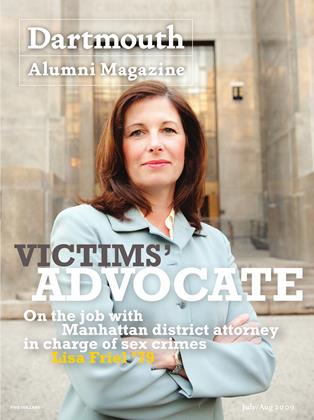President J.B. Daukas ’84 explains what’s new with the Alumni Council and shares his thoughts on College governance.
What changes have you made to the council recently? After years of study and some false starts in December 2007 we radically reformed the Alumni Council to better represent alumni and to serve as their principal voice to the College—which is part of our primary mission. We added representatives for every alumni class through the 55th reunion year, and we tripled the number of representatives who represent our oldest alumni. Formerly, all classes had to share representatives.
You also formed an alumni liaison committee (ALC). What is its purpose? It’s a small working group of 12 consisting of leaders of the council, the Association of Alumni (AoA) and other alumni who meet regularly with the trustees and engage in two-way dialogue. We also created a culture within the Alumni Council where councilors regularly and consistently communicate with their constituents and solicit questions, comments and opinions—both positive and negative—that the ALC can take to the board of trustees or administration. This represents an enormous change.
Why do you call this “enormous” change? There was a time in the past when the Alumni Council did not seem to be actively representing alumni. For many years I had no idea who my Alumni Council representative was. The recent changes and increased ability of alumni to communicate with the College will greatly benefit Dartmouth. We’re not done, either. We’re now studying and shortly will recommend best practices for ways in which classes, clubs, affiliated groups and professional schools choose their council representatives.
What has the council done to help students? This past fall we created an ad hoc committee to support Greek organizations, which could use significant support in terms of repair and improvement of physical plants, greater alumni involvement, more sorority housing and enhanced interaction with the faculty. The committee may serve as a model to support other student groups on campus in the future.
What, specifically, have you spoken to trustees about regarding governance issues? We’ve asked the board to consider the prospect of adding additional alumninominated trustees. Trustees we have spoken to have been receptive to exploring this issue. The council also opposed lawsuits filed against the College two years ago and earlier this year, and provided testimony against legislation that would have ceded control of Dartmouth’s charter to the New Hampshire legislature.
What do you think is alumni’s biggest misperception of the council? That the Alumni Council is a bunch of “insiders” or “administration puppets.” I am walking proof that this is not the case. I’ve been critical of certain actions of the College, particularly during the 1990s. I was a member of Dartmouth Alumni for Open Governance in the early 1990s, I ran as a petition candidate for the AoA in 2003 and 2004 and I wrote for The Dartmouth Review as an undergrad. Certainly no insider here. But I have seen that the College very much wants to reach out and work with its alumni. It is time for alumni to declare victory, to stop fighting among ourselves and with the administration and to get on with helping Dartmouth.
What do you think of the trustees’ decision to reelect petition trustees T.J. Rodgers ’70 and Peter Robinson ’79, but not Todd Zywicki ’88, to second terms on the board? Zywicki discouraged donations to Dartmouth and sought to divert them to his employer. He criticized the motives of those who do give to Dartmouth, described former President Jim Freedman as a “truly evil man” and called President Jim Wright—a Marine and veterans’ advocate—and others who lead the College godless and unpatriotic. In 2007 the Alumni Council voted overwhelmingly to condemn Zywicki’s statements, and one should remember that only 11 percent of all alumni had voted for him in a six-way race in 2005. I think Zywicki’s comments were inconsistent with his position as trustee. In contrast, the board’s reelection of Rodgers and Robinson, even though both have been critical of the College and supported a lawsuit against it, indicates that the Zywicki decision had to do with his conduct, not his views.
How would you assess the current state of alumni-College relations? After a good deal of controversy during the last several decades I think Dartmouth is entering a golden age of alumni-College relations. The trustees and administration understand that alumni want to be heard, and they are listening.
 View Full Issue
View Full Issue
More From This Issue
-
 Feature
FeatureWho is John MacGovern?
July | August 2009 By Dirk Olin ’81 -
 Cover Story
Cover StoryJustice for All
July | August 2009 By Irene M. Wielawski -
 Feature
FeatureIn Too Deep
July | August 2009 By PETER HELLER ’82 -
 OUTSIDE
OUTSIDEThe Skipper
July | August 2009 By Sarah Tuff -
 Article
ArticleNewsmakers
July | August 2009 By BONNIE BARBER -
 FILM
FILMLife’s Big Questions
July | August 2009 By Lauren Zeranski ’02
Sean Plottner
-
 Article
ArticleBallot Time Again
May/June 2008 By Sean Plottner -
 notebook
notebookLOOK WHO’S TALKING
NOVEMBER | DECEMBER 2017 By Sean Plottner -
 notebook
notebookBreakaway
SEPTEMBER | OCTOBER 2020 By Sean Plottner -
 notebook
notebookMan of Numbers
JULY | AUGUST 2021 By Sean Plottner -
 notebook
notebook“Games Saved My Life”
MARCH | APRIL 2024 By Sean Plottner -
 pursuits
pursuitsLYNN LOBBAN ’69 One of a Kind
MAY | JUNE 2024 By Sean Plottner
Interviews
-
 Interview
Interview“We’ve Got To Go For It”
July/Aug 2002 By Brad Parks ’96 -
 THE DAM INTERVIEW
THE DAM INTERVIEWJim Kim
Jan/Feb 2012 By Irene M. Wielawski -
 INTERVIEW
INTERVIEWLook Who’s Talking
MARCH | APRIL 2022 By Julia Robitaille ’23 -
 Interview
Interview“This is the Right Fit”
Sept/Oct 2011 By Lauren Vespoli ’13 -
 INTERVIEW
INTERVIEWFrom Advocate to Enforcer
SEPTEMBER | OCTOBER 2025 By Matthew Mosk ’92 -
 INTERVIEW
INTERVIEWFrozen Fieldwork
MAY | JUNE 2021 By Svati Kirsten Narula ’13

